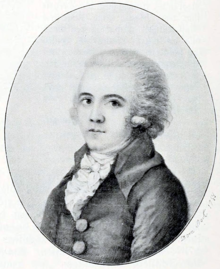Ludwig Ferdinand Huber | |
|---|---|
 Portrait by Dora Stock, 1788 | |
| Born | 1764 Paris, France |
| Died | 24 December 1804 (aged 40) |
| Other names | Louis Ferdinand Huber |
| Occupations |
|
| Spouse | |
Ludwig Ferdinand Huber or Louis Ferdinand Huber (1764 – 24 December 1804) was a German translator, diplomat, playwright, literary critic, and journalist. Born in Paris, Huber was the son of the Bavarian-born writer and translator Michael Huber and his French wife Anna Louise, née l'Epine. He grew up bilingual in French and German after his parents moved to Leipzig when he was two years old. He lacked a classical education but read voraciously and was well versed in modern languages, and started publishing translations from French and English at an early age. He also translated plays that were performed in theatres all over Germany. In the early 1780s, Huber became friends with the jurist Christian Gottfried Körner, his fiancée Minna Stock, and her older sister Dora Stock, whom he later promised to marry. Together, the friends wrote in admiration to the poet Friedrich Schiller and successfully invited him to come to Leipzig. Körner and Minna were married in 1785 and lived in Dresden, where they were joined by Dora, Schiller, and finally Huber, who shared a house with Schiller.
Huber found employment as a diplomat, and in 1788 moved to Mainz, where he started a friendship with the world traveller Georg Forster and his wife Therese. In 1790, he became Therese's lover and moved into the Forsters' house. He wrote original plays, most notably Das heimliche Gericht ('The Secret Court'), but without much success, and turned to literary criticism. When rumours about his affair with Therese started to spread in literary circles, Huber broke his engagement with Dora, ending his friendship with Körner and damaging his relations with Schiller. When the French revolutionary army under Custine entered Mainz, Huber moved to Frankfurt, but stayed in contact with the Forsters, causing suspicion among his superiors. Therese Forster left Mainz for Strasbourg and then to the neutral territory of Neuchâtel in present-day Switzerland, and Huber quit his diplomatic service to be with her. Georg Forster went to Paris as representative of the Republic of Mainz. After Forster agreed to a divorce, there was a final meeting of Forster with his family and Huber in Travers in November 1793, but Forster died in January 1794 before the divorce could be finalised, and Huber married Therese in April 1794. They moved to Bôle and collaborated on translations, while Huber also was active as a publicist and reviewer. He became a friend of the writer Isabelle de Charrière and translated several of her works.
In 1798, Huber returned to Germany, becoming editor in chief of Cotta's Allgemeine Zeitung in September. For political reasons, the newspaper moved from Tübingen via Stuttgart to Ulm, where Huber was given a title and an annual salary by the Elector of Bavaria in March 1804. After a journey to Leipzig and Göttingen, Huber fell ill and died in December 1804. He was mostly forgotten after his death, and was considered of interest mostly as a friend of Schiller, Forster and de Charrière. Some of his literary criticism had long lasting importance, especially his reviews of Goethe's works.